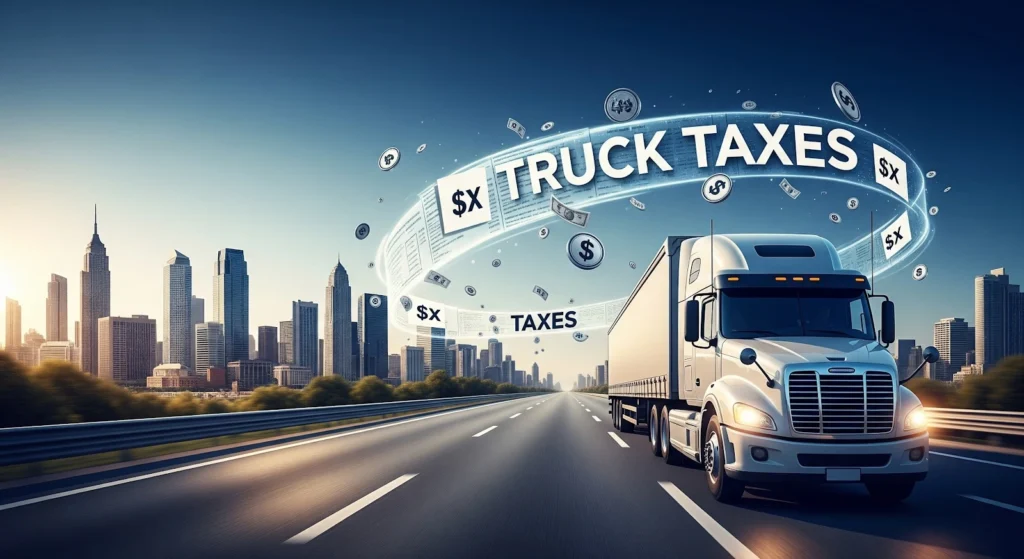Running a successful trucking business isn’t just about keeping the wheels turning — it’s also about keeping your finances in check. For owner-operators and independent drivers, understanding trucker deductions is a key part of maximizing profits and reducing tax liability. Every dollar saved through eligible business deductions directly impacts your bottom line.
The trucking industry comes with unique expenses that many drivers overlook during tax season. From fuel and maintenance to permits and lodging, knowing what you can legally deduct helps reduce your taxable income — meaning you keep more of your hard-earned money.
Whether you’re new to being an owner-operator or you’ve been hauling for years, staying informed about available trucker deductions ensures you aren’t leaving money on the table. This guide breaks down the most common deductions every trucker should know, helping you stay compliant, avoid IRS issues, and make the most of your business income.
Why Trucker Deductions Matter
For owner-operators and small fleet owners, trucking is more than just a job — it’s a business. Like any business, understanding and leveraging tax deductions is crucial for long-term financial success. Trucker deductions can significantly lower your taxable income, reducing the amount you owe the IRS and keeping more money in your pocket.
While the IRS allows numerous deductions for truckers, they also require accurate recordkeeping and compliance. Failing to properly document expenses or misunderstanding what qualifies as a deduction can lead to costly mistakes, including:
- Overstating expenses, which may trigger audits or penalties
- Missing eligible deductions, leaving money on the table
- Using incorrect or outdated VINs on tax forms, delaying filings
- Filing under the wrong tax category for your vehicle’s weight or mileage
Owner-operators must keep clear, organized records of all business-related expenses. Receipts, invoices, mileage logs, and maintenance records are essential for substantiating your deductions if audited.
Top Trucker Deductions to Know
Understanding what qualifies as legitimate trucker deductions is essential for minimizing tax liability and keeping your business profitable. Below are the most common deductions every owner-operator should track and claim.
1. Vehicle Expenses
Your truck is your business’s backbone — and fortunately, many of its costs are tax-deductible.
- Depreciation of Trucks and Trailers: You can deduct the depreciation of your truck or trailer over time, helping offset the major upfront investment. The IRS allows depreciation over several years, which can significantly reduce taxable income.
- Lease Payments: If you’re leasing your vehicle instead of purchasing, lease payments are considered a deductible business expense.
- Truck Loan Interest: For financed vehicles, the interest portion of your loan payments is tax-deductible, though the principal is not.
2. Fuel Costs
Fuel is one of the largest expenses for truckers — and luckily, it’s fully deductible when used for business purposes.
- Fuel Purchases: All diesel, gas, and other fuel costs for your truck can be claimed as deductions. Keep detailed records, including receipts and mileage logs.
- Fuel Card Fees: If you use a fuel card, any associated service fees or administrative costs are deductible.
- Importance of Keeping Accurate Fuel Receipts: The IRS may request proof of fuel expenses, so maintaining organized, itemized fuel receipts is critical to avoid issues during audits.
3. Maintenance & Repairs
Keeping your vehicle roadworthy isn’t optional — and the good news is, most maintenance costs are deductible.
- Routine Maintenance: Expenses for oil changes, tire replacements, brakes, and other regular upkeep are fully deductible.
- Emergency Repairs: Unexpected repairs such as engine work, transmission fixes, or towing services are eligible deductions.
- Truck Washes: Keeping your truck clean isn’t just good for business image — truck wash expenses also qualify as deductions.
4. Insurance Premiums
Insurance is an unavoidable part of the trucking industry, but your premiums can lower your tax bill.
- Truck Insurance: Policies covering physical damage, liability, and other trucking risks are deductible.
- Cargo Insurance: If you carry cargo insurance to protect your loads, those premiums are considered business expenses.
- Liability and Health Insurance (If Self-Employed): Self-employed truckers may also deduct health insurance premiums, reducing personal tax liability.
5. Licensing & Permits
Operating legally requires licenses and permits — many of which qualify as tax deductions.
- CDL Fees: The cost of obtaining or renewing your Commercial Driver’s License is deductible.
- HVUT (Form 2290) Payments: Your Heavy Vehicle Use Tax (HVUT) paid through Form 2290 is a deductible business expense — and ExpressTruckTax makes it easy to file accurately and quickly.
- State Permits and Registration: Expenses for state-specific permits, registration renewals, and related administrative fees are deductible.
6. Travel Expenses
Life on the road involves significant travel costs — many of which can be deducted with proper documentation.
- Lodging During Long Hauls: Hotel stays and overnight accommodations when away from home are deductible if they are for business purposes.
- Meals (Per Diem Rates and Logbook Requirements): Meals on the road are deductible, often based on standard IRS per diem rates. Keep detailed trip logs to validate these deductions.
- Parking and Toll Fees: Any costs for toll roads, bridges, or parking while operating your truck are considered business expenses.
7. Communication Tools
Staying connected on the road is vital — and so are the deductions related to it.
- Cell Phone Bills (Business Portion): The portion of your cell phone usage dedicated to business — calls, data, etc. — is tax-deductible.
- Internet or Satellite Radio Subscriptions (Business Use): If you use internet hotspots, satellite radio, or similar services for navigation, weather updates, or business communication, those costs are deductible.
8. Professional Services
Running a trucking business often requires outside expertise — and the costs can reduce your taxable income.
- Tax Preparation Fees: Fees for filing taxes, including services like ExpressTruckTax or other preparers, are deductible.
- Accounting or Legal Services: Any legal or accounting assistance for your business operations is tax-deductible.
- Industry Association Memberships: Membership dues for trucking associations or professional groups that support your business are deductible.
9. Office Supplies & Technology
Running your business efficiently often means investing in tech and supplies — and many qualify as deductions.
- GPS Systems, Tablets, Laptops: Devices used for navigation, load tracking, or business management can be deducted.
- Office Supplies for Business Management: Paperwork, filing systems, office equipment, and similar supplies are eligible deductions.
- ELD (Electronic Logging Device) Costs: Costs for purchasing, installing, and maintaining ELDs, which are required by law, are deductible.

Keeping Records for Deductions
Maximizing your trucker deductions starts with one critical habit: keeping detailed, organized records. The IRS requires proper documentation to validate all claimed expenses, and failing to maintain accurate records can lead to missed deductions, penalties, or even an audit. For owner-operators, good recordkeeping isn’t just about taxes — it’s about protecting your business and ensuring you get every dollar you’re entitled to.
Importance of Detailed Documentation
The IRS expects clear, verifiable proof for all business expenses you claim as deductions. If you’re ever audited, incomplete or vague records can result in denied deductions, extra taxes owed, and additional penalties. Detailed documentation provides:
- Proof of legitimate business expenses
- Peace of mind during tax season
- Stronger defense if audited
- Greater accuracy for filings like Form 2290 or tax returns
Good recordkeeping also helps track your business’s overall financial health — allowing you to plan for expenses, monitor profitability, and make informed decisions.
Tips for Organizing Receipts and Expense Logs
Staying organized can feel overwhelming, especially for busy truckers constantly on the road. But with a few simple habits, you can maintain easy, IRS-compliant records:
Save Every Receipt: Whether it’s fuel, maintenance, meals, lodging, or tolls — keep all physical receipts related to your business.
Label and Categorize: Sort receipts by category (fuel, repairs, meals, etc.) and note the purpose on the receipt itself when possible.
Keep a Mileage Log: Track all business-related mileage accurately, especially for trips where you claim per diem or travel expenses.
Use Envelopes or Folders: Keep physical receipts in labeled envelopes or folders in your truck, making it easy to organize weekly or monthly.
Digitize Paper Receipts: Take photos or scan receipts regularly to avoid faded or lost paper copies.
Update Expense Logs Consistently: Set a routine to log expenses daily or weekly, rather than letting them pile up.
Digital Tools and Apps for Expense Tracking
Modern technology makes managing your records easier than ever. Several apps and tools are designed specifically for truckers and small businesses, helping you stay organized while on the move:
Expense Tracking Apps: Use apps like QuickBooks Self-Employed, Everlance, or TruckBytes to log expenses, scan receipts, and categorize deductions.
Fuel Card Portals: Many fuel cards come with built-in expense tracking and reporting tools — a convenient way to document fuel purchases and fees.
Cloud Storage: Store digital copies of receipts and documents in secure platforms like Google Drive, Dropbox, or OneDrive for easy access and backup.
Tax Filing Platforms: Services like ExpressTruckTax not only simplify your Form 2290 filing but also keep copies of your tax records, IRS Schedule 1, and payment confirmations accessible anytime.
By staying consistent with your recordkeeping and using available tools, you’ll not only maximize your deductions but also reduce the stress of tax season and ensure your trucking business stays compliant and profitable.
How ExpressTruckTax Supports Truckers
Maximizing your trucker deductions and staying compliant with tax regulations can be overwhelming, especially for busy owner-operators and fleet managers. That’s where ExpressTruckTax makes a difference. As the leading IRS-authorized e-file provider for Form 2290, ExpressTruckTax offers a full suite of tools to simplify your HVUT filing process, reduce costly errors, and help you stay organized for tax season.
Accurate HVUT Filing to Avoid Penalties
Filing Form 2290 — the Heavy Vehicle Use Tax — is mandatory for vehicles with a taxable gross weight of 55,000 pounds or more. Mistakes in your HVUT filing can lead to:
- IRS penalties and late fees
- Delays in receiving your Schedule 1, required for DMV registration
- Registration issues that could sideline your truck
ExpressTruckTax provides a user-friendly, step-by-step filing process with built-in error checks to help you:
- Enter accurate vehicle and business details
- Calculate the correct HVUT amount based on your truck’s weight
- Choose your preferred IRS payment method
- Receive your stamped Schedule 1 in minutes
Our guaranteed Schedule 1 delivery ensures you get your proof of payment quickly — or your money back.
Free VIN Correction and Amendment Services
Mistakes happen — but with ExpressTruckTax, they don’t have to cost you. We offer:
Free VIN Corrections: If you filed with ExpressTruckTax and made a typo in your Vehicle Identification Number (VIN), you can correct it for free and avoid DMV delays.
2290 Amendments Made Simple: If your vehicle’s taxable gross weight increases or you exceed the mileage limit for suspended vehicles, you’re required to file an amendment. ExpressTruckTax guides you through:
- Weight increase amendments
- Mileage exceeded filings
- Instant IRS transmission and updated Schedule 1
This keeps you compliant, avoids penalties, and ensures your vehicle stays road-ready.As an owner-operator, staying on top of your eligible deductions isn’t just smart — it’s essential to running a profitable, compliant trucking business. From fuel and maintenance to HVUT payments and professional services, each deduction helps reduce your tax burden and increase your bottom line.



